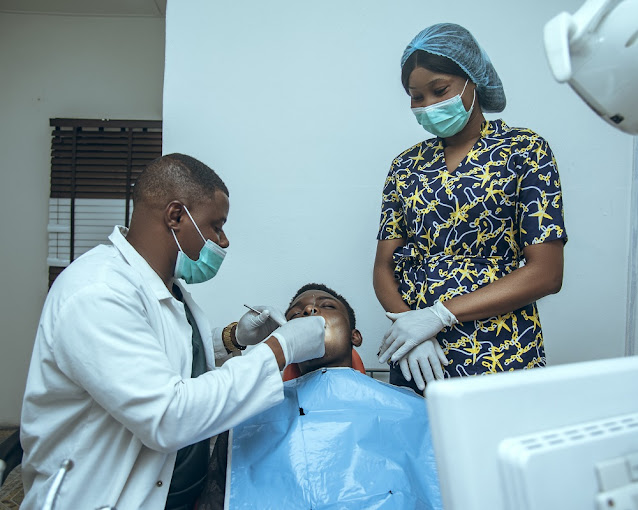Fear is a natural response, but when that fear begins to interfere with essential aspects of our health, it becomes a problem that needs to be addressed. Dental phobia — a persistent and often overwhelming fear of visiting the dentist — is a common condition that prevents millions of people from getting the oral care they desperately need. But is it all in the head? Or is there more to the story?
At Olive Dental Clinic, we are dedicated to providing comprehensive dental solutions that enhance both oral health and confidence. This blog post will explore the deeper reality of dental phobia, its causes, symptoms, and practical steps to overcome it so you can take back control of your oral health without fear holding you back.
What Is Dental Phobia?
Dental phobia is a severe form of dental anxiety. While many people may feel uneasy about visiting the dentist, individuals with dental phobia often experience an irrational fear that can be so intense, they completely avoid dental treatment — even when in pain or facing serious oral health issues.
It goes beyond simple discomfort. Dental phobia can lead to total avoidance of dental visits, putting one’s oral and overall health at serious risk. Some people can’t even think about making a dental appointment without feeling dread, panic, or even physical symptoms like nausea or dizziness.
In some cases, the fear is linked to specific elements such as the sound of a dental drill, the sight of needles, or the general atmosphere of a dental office. For others, it may be rooted in past trauma, a feeling of loss of control, or generalized anxiety that spills over into dental care.
The key thing to understand is this: dental phobia is very real — and you’re not alone if you experience it.
Is Dental Phobia “All in the Head”?
The question implies that the fear might be irrational or exaggerated. While dental phobia does originate in the mind — as all phobias do — that doesn’t mean it’s imaginary or easy to dismiss. Psychological experiences can be just as real and debilitating as physical ones.
In fact, dental phobia often stems from deeply rooted emotional responses. These may be triggered by:
- A traumatic dental or healthcare experience in the past
- Painful or uncomfortable procedures during childhood
- Anxiety disorders, depression, or PTSD
- A sense of helplessness or loss of control in the dental chair
- Embarrassment or fear of being judged by the dentist for poor oral health
- Mistrust in medical professionals due to prior negative encounters
These psychological triggers produce very real symptoms — from racing heartbeats and panic attacks to nausea and dizziness. The body responds to perceived threats, whether they’re physical or emotional. So no, dental phobia isn’t “just in your head” — it’s a genuine medical concern that needs compassion and management.
Common Signs and Symptoms of Dental Phobia
Recognizing the signs of dental phobia is the first step toward addressing it. Symptoms can vary in severity but typically include:
- Profuse sweating when thinking about or entering a dental clinic
- Rapid heartbeat (tachycardia) or chest tightness
- Shaking or trembling
- Feeling lightheaded or even fainting during dental appointments
- Nausea or an upset stomach
- Avoiding dental appointments altogether
- Crying, panic attacks, or visible distress at the thought of treatment
- Irritability, anger, or defensiveness when discussing dental care
Some individuals may use humor or aggression as a coping mechanism to mask their fear. Others may withdraw entirely, finding it difficult to even pick up the phone to schedule an appointment.
These signs should not be ignored. Untreated dental anxiety can cause a person to live with pain, infection, and even serious health complications due to neglected oral health.
Causes of Dental Phobia
Understanding where your fear comes from can be transformative. While the specific causes can vary, the most common reasons include:
1. Past Traumatic Dental Experiences
If you’ve had a painful, uncomfortable, or traumatic experience at the dentist — especially as a child — it can create lasting psychological damage. That memory may resurface anytime you even think about dental treatment.
2. Fear of Pain
This is one of the most common triggers. Even though dental techniques have drastically improved over the years and are mostly painless, the fear of anticipated pain can still overpower logic.
3. Embarrassment About Oral Health
People who haven’t seen a dentist in years might feel embarrassed about the condition of their teeth and fear being judged. This shame adds another layer of anxiety, making them more likely to avoid treatment.
4. Generalized Anxiety or PTSD
Individuals with anxiety disorders or a history of trauma, including PTSD, may feel unsafe in medical settings — especially where vulnerability and physical proximity are involved, such as during dental procedures.
5. Fear of Loss of Control
Lying in a dental chair, unable to see what’s happening and feeling trapped, can make some people feel helpless. That loss of control becomes a key trigger for panic or fear.
6. Negative Influence from Others
Sometimes, dental fear isn’t even based on personal experience. Hearing horror stories from family, friends, or even online sources can plant seeds of fear, particularly in children.
The Real-Life Impact of Dental Phobia
The consequences of dental phobia can be severe. Avoiding the dentist can lead to:
- Tooth decay and cavities
- Gum disease
- Tooth loss
- Bad breath and oral infections
- Difficulty chewing and speaking
- Decreased self-esteem due to poor oral aesthetics
- Higher risk of systemic issues such as heart disease or diabetes-related complications
In short, untreated dental anxiety creates a vicious cycle: fear leads to avoidance, which leads to worsening dental conditions, which leads to greater fear.
But here’s the good news — dental phobia is treatable.
Practical Ways to Manage Dental Phobia
At our clinic, we’re committed to providing comprehensive dental solutions that not only treat the problem but also care for your emotional well-being. Here are practical and proven strategies to manage dental anxiety:
1. Communicate With Your Dentist
The most important step is to speak up. Let your dentist know how you’re feeling. Be honest about your fears, past experiences, and any specific triggers. A compassionate dental team will adjust their approach to make you feel as safe and comfortable as possible.
2. Start With a Non-Invasive Visit
Schedule a consultation without any procedure involved. Simply touring the clinic, meeting the staff, and talking to the dentist can go a long way in reducing fear. It helps build trust and familiarity before any treatment is considered.
3. Explore Sedation Dentistry
Depending on your level of anxiety, your dentist might suggest sedation options such as nitrous oxide (laughing gas), oral sedatives, or even IV sedation for more complex procedures. These options help you relax and may make the entire experience more manageable.
4. Try Relaxation Techniques
Deep breathing, guided meditation, or progressive muscle relaxation can help reduce physical symptoms of anxiety. Practicing these techniques before and during appointments can be very helpful.
5. Bring a Support Person
Having a trusted family member or friend accompany you can provide emotional support and reduce feelings of vulnerability. Some clinics welcome a support companion to stay during the consultation or procedure.
6. Use Distractions
Some patients find it helpful to listen to music, watch a video, or use stress balls during procedures. Sensory distractions can shift the focus from fear to comfort.
7. Seek Professional Therapy
If your dental phobia is deeply rooted or linked to trauma, a mental health professional such as a therapist or psychologist can help you work through the fear using cognitive behavioral therapy (CBT) or exposure therapy.
Supporting Children With Dental Anxiety
Children are especially susceptible to dental phobia, often due to unfamiliarity or a single bad experience. Parents play a crucial role in shaping how children perceive dental visits.
Here’s how you can help a child manage dental fear:
- Talk positively about going to the dentist
- Read children’s books about dental visits together
- Avoid using dental treatment as a threat or punishment
- Choose a child-friendly, patient-focused dental clinic
- Schedule early and regular visits to build familiarity and trust
- Be calm and encouraging — your child picks up on your emotions
When a child feels supported and safe, their anxiety can be managed effectively and may not carry into adulthood.
You Don’t Have to Live in Fear
Dental phobia is not a weakness, and it’s not something to be ashamed of. What’s important is taking the first step toward reclaiming your oral health. With the right support, knowledge, and dental team, it’s entirely possible to receive dental treatment without fear controlling the process.
We are committed to helping you every step of the way — with empathy, patience, and a strong focus on both your physical and emotional comfort. Our comprehensive dental solutions are designed not only to improve your oral health but also to restore your confidence in seeking care.
Your smile, your well-being, and your peace of mind matter.
You’re not alone. You’re not imagining it. And you are not without solutions.



